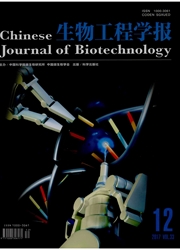

 中文摘要:
中文摘要:
hARD1蛋白是一个乙酰基转移酶,催化蛋白质N末端的乙酰化。前期的研究发现hARD1的高表达可能作为乳腺癌的一个指标。为了制备在乳腺肿瘤组织中特异识别的抗hARD1的单克隆抗体,将纯化的全长hARD1/Histag融合蛋白(1~235aa)免疫Balb/c小鼠,获得了8个稳定的阳性单克隆细胞株,酶联免疫吸附测定(ELISA)结果表明,所得抗体的轻链均为K型,重链为3种亚型:IgG1、IgG2a和IgG2b。在不同肿瘤组织样本中进行抗体特异性筛选,获得一个在乳腺肿瘤组织中具有相对特异性的抗hARD1单克隆抗体,为进一步将抗hARD1的单克隆抗体应用于乳腺癌的病理诊断奠定基础,同时也为进一步研究hARD1在肿瘤发生中的作用提供了重要的工具。
 英文摘要:
英文摘要:
Human arrest defective 1(hARD1) is an acetyltransferase catalyzing the N-terminal acetylation of proteins after translation. The high expression of hARD1 could be an indicator of the breast cancer. In current study, we produced an anti-hARDlp monoclonal antibody that could specifically recognize ARD1 in breast cancer tissues by using the immunohistochemical assay. The full-length His-tag hARD1 protein (1-235 aa) was over-expressed in Escherichia coli, and purified recombinant protein was injected into Balb/c mice to perform immunization procedure. Eight stable positive monoclonal cell lines were isolated. ELISA results demonstrated that all light chains of antibodies were k, and the heavy chains displayed three subtypes IgG1, IgG2a and IgG2b,respectively. A monoclonal antibody, which could specifically recognize hARD1 protein in breast cancer tissues, was identified by screening different cancer tissues using antibody-specificity method. Further, the specificity of the antibody was confirmed by Western blotting analysis. Our study would facilitate breast cancer diagnosis by using this ARD1 monoclonal antibody in clinic. Also, this antibody could be used as an important tool for further investigating the role of ARD1 in tumorigenesis.
 同期刊论文项目
同期刊论文项目
 同项目期刊论文
同项目期刊论文
 期刊信息
期刊信息
